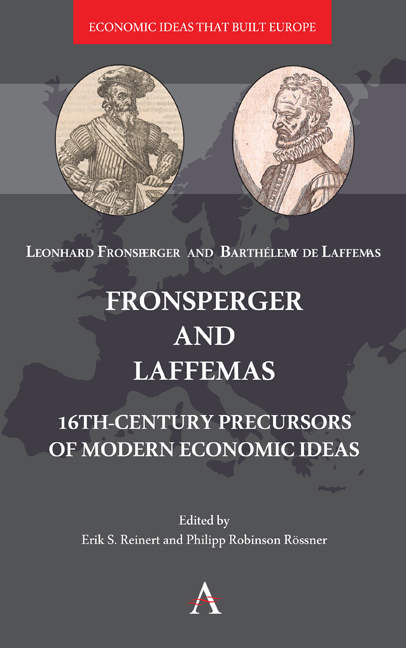Book contents
- Frontmatter
- Contents
- Introduction
- 1 Barthélemy de Laffemas (1545–CA. 1611) as an Early Economist: Context and Scholarly Voices in the English-language Literature
- 2 General Regulation for the Establishment of Manufactures (1597)
- 3 Leonhard Fronsperger (1520–CA. 1575) as an Early Apology of the Market Economy
- 4 Leonhard Fronsperger ‘On the Praise of Self-Interest’ (1564)
2 - General Regulation for the Establishment of Manufactures (1597)
Published online by Cambridge University Press: 28 February 2024
- Frontmatter
- Contents
- Introduction
- 1 Barthélemy de Laffemas (1545–CA. 1611) as an Early Economist: Context and Scholarly Voices in the English-language Literature
- 2 General Regulation for the Establishment of Manufactures (1597)
- 3 Leonhard Fronsperger (1520–CA. 1575) as an Early Apology of the Market Economy
- 4 Leonhard Fronsperger ‘On the Praise of Self-Interest’ (1564)
Summary
Full title:
General regulation for the establishment of manufactures in this kingdom to contain the cost of silk fabric and other merchandise that harms and ruins the state, which is the true way of restoring France to her splendor, provide work for the poor, and keep them from begging for a living.
With an extract of the opinion which the Lords of the Assembly held in Rouen have sent to his Majesty, that the entrance of all sorts of gold thread and woolens manufactured outside the kingdom be prohibited here, and that levies on woolens and raw silk be suppressed.
Along with the means of producing silks throughout France.
[By Barthélemy de Laffemas.]
Paris: C. de Monstr’oeil et Jean Richer, 1597.
By privilege of the king.
A note by the translator and the general editor.
The introduction will show that Mr. Laffemas was not raised as a man of letters. If anything, the author of this treatise was certainly more accustomed to legal documents than anything else. His language is often rigid and haphazardly punctuated, so I have had to take some risks in modernising it. Its pre-economic and pre-industrial vocabulary is fraught with difficulties, of which the most general are these:
1. Police is used to designate a system: an economic policy but also the structure that is adopted to support it. Thus, it should be understood that policy in this document does not mean only policy but also this frame. Accordingly, a dictionary of 1606 gives this complex definition: Police ‘is a regulation of a state and community, whether monarchical, aristocratic, or democratic, in supplies, clothing, trade, and other things that concern the welfare of all. It comes from the Greek politéia, derived from polis, city, because the city was first subject to such regulation […].’
2. Manufacture as a noun has no obvious equivalent in modern English. It means a place or structure where things are made by man, as opposed to the production of raw materials, or the process itself. The same dictionary just quoted calls it ‘the making of some piece of work by hand’. Here we use the term in the same sense as Alexander Hamilton's famous 1791 Report on Manufactures to the US House of Representatives.
- Type
- Chapter
- Information
- Fronsperger and Laffemas16th-Century Precursors of Modern Economic Ideas, pp. 17 - 78Publisher: Anthem PressPrint publication year: 2023

